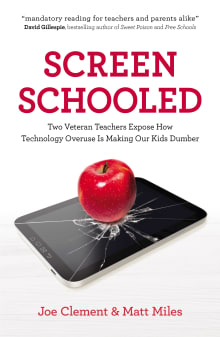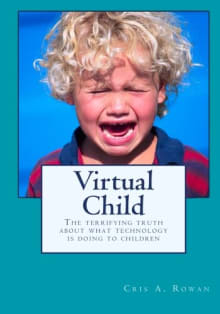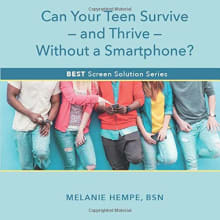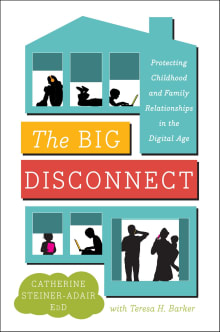The best books on the effects of screen time on kids (based on neuroscience)
I am an integrative child psychiatrist with a special focus on how screen-time detunes the nervous system, causing issues with sleep, mood, focus, and behavior. In fact, technology use is the most underestimated influence of our time; it causes problems whose connections aren’t always obvious, leads to misdiagnosis and overmedication, and wastes resources. I am passionate about helping children and families methodically reverse these changes using screen fast protocols that provide dramatic improvements in functioning and well-being. I speak regularly to parents’ groups, schools, and health providers, and my work has been featured on such outlets as NPR, CNN, NBC Nightly News, Psychology Today, and Good Morning America.
Reset Your Child’s Brain: A Four-Week Plan to End Meltdowns, Raise Grades, and Boost Social Skills by Reversing the Effects of Electronic Screen
By Victoria Dunckley

What is my book about?
Increasing numbers of parents grapple with children who are acting out without obvious reason. Revved up and irritable, many of these children are diagnosed with ADHD, bipolar illness, autism, tics, or other disorders but don’t respond well to treatment. Based on emerging scientific research and extensive clinical experience, Dr. Dunckley argues that the frequent underlying cause is overstimulation of the nervous system from too much screen time, wreaking havoc on brain chemistry, the body clock, stress hormones, and more.
This book offers a simple intervention that can produce a life-changing shift in brain function. Dr. Dunckley provides hope for parents who feel that their child has been misdiagnosed or inappropriately medicated, by presenting an alternative explanation for their child’s difficulties and a concrete plan for treating them.
Shepherd is reader supported. When you buy books, we may earn an affiliate commission.
The books I picked & why
Screen Schooled: Two Veteran Teachers Expose How Technology Overuse Is Making Our Kids Dumber
By Joe Clement, Matt Miles

Why did I love this book?
I found myself wanting to stand up and applaud while reading this book. The description of what a kid really does on a typical day at school is alone worth the purchase (and will make you laugh… and then heave a deep sigh.) But more importantly, these two teachers outline the pitfalls our digitally-driven world has created in terms of education, deep thinking, social responsibility, and ability to problem solve. As someone who has done a lot of research into the “screens in school” topic, I found this book to be thorough and clear, and written with enough humor to make a tough topic palatable. Explore this book
Spark: The Revolutionary New Science of Exercise and the Brain
By John J. Ratey, Eric Hagerman

Why did I love this book?
Discussing the negative impacts of screen time (and its close cousin, sedentariness) can feel overwhelming. In contrast, discovering ways to make the brain stronger is empowering. In this startling book, Dr. Ratey explores exercise’s dramatic impact on the brain and shows how it can not only improve cognitive functioning but actually make the brain bigger and more connected. While as a psychiatrist I have long-prescribed exercise to improve depression, anxiety, and sleep, after reading Spark I had a newfound respect and awe for not just the power of exercise but for the plasticity of the brain itself. This book gives new hope to those who have or work with kids with neuropsychiatric conditions or who are struggling, stuck, or otherwise disadvantaged.Explore this book
Virtual Child: The Terrifying Truth about What Technology Is Doing to Children
By Cris A. Rowan

Why did I love this book?
Written by a pediatric occupational therapist, this book offers unique insight into how screen-based technology acts as a physical restraint which undermines, fragments, and disorganizes various systems, resulting in delays and acting out. Rowan dives deep, and her concepts and explanations have informed my work greatly. Some critical points include her explanations of how video games increase visual distractibility, how not practicing hand-printing affects the ability to read, and how core strength influences the ability to learn. Explore this book
Can Your Teen Survive—and Thrive—Without a Smartphone?
By Melanie Hempe

Why did I love this book?
This gem of a book presents the argument that parents should consider delaying giving their children smartphones until the child becomes an adult and has attained certain life skills. A mother of four, former nurse, and founder of ScreenStrong, author Melanie Hempe lived through digital addiction in her own family and is passionate about helping other families avoid her “mistakes”. At the same time she is well-versed in the current scientific literature across a broad array of tech-related topics, and she successfully “walks the talk”: her teens abstain from gaming/social media/smartphone use, but they are far from being socially ostracized – a common fear amongst parents.Explore this book
The Big Disconnect: Protecting Childhood and Family Relationships in the Digital Age
By Catherine Steiner-Adair, Teresa H. Barker

Why did I love this book?
This book will make you a little uneasy; some of the descriptions and scenarios are downright disturbing. Yet the information is necessary to navigate parenting in today’s world. I felt a strange form of validation reading this work, as I’m all too aware of these issues (bullying, kids feeling ignored, sexting, lack of empathy, etc), but when I bring them up, parents often respond that I have a skewed perspective. But as Dr. Steiner Adaire points out, the kids themselves say “parents are clueless” about their kids’ digital lives. Her writing is beautiful, and her advice about helping kids think critically about online behavior is second to none. Explore this book


